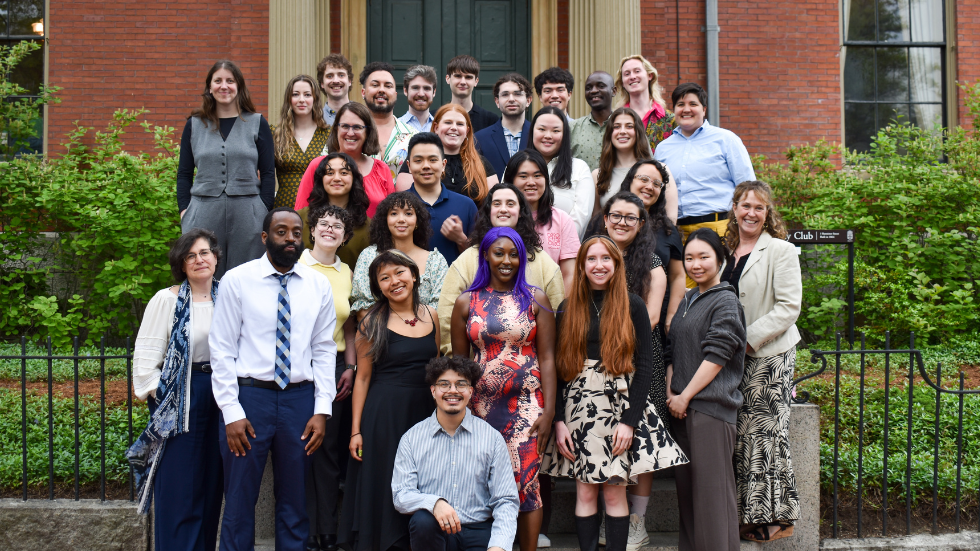The Capstone Project is the culminating experience of Brown’s Master of Arts in Teaching (MAT) program. Throughout their yearlong residency in local secondary schools, MAT students engage in a sustained inquiry into their own teaching practice—applying what they’ve learned in coursework to design, implement, and reflect on a unit of instruction that meets the needs of their students and communities.
Each student selects a specific teaching approach aligned with their subject area and school context. They examine relevant research, design and teach a standards-based unit, develop multiple assessments to guide instruction, and analyze student learning to refine their practice.
“This year’s MATs have shown incredible commitment and creativity,” says Professor Katie Rieser, Director of the MAT Program. “They’ve strengthened media literacy through critical analysis, fostered civic engagement with speech and writing, and used visual tools (from diagrams to documentary film) to deepen student understanding. Their projects reflect not only what they’ve learned, but also who they are becoming as educators.”
“These capstones mark the beginning of each teacher’s professional journey. Grounded in inquiry and shaped by real classrooms, they represent the promise and power of equity-centered, research-informed teaching,” she continued.
Below is a list of MAT students from the Class of 2025 and the titles of their presentations.
Alana Gerber | Reading Between the Lies: Using Author’s Purpose as a Lens to Analyze Propaganda and Strengthen Media Literacy in the ELA Classroom
Ariel Markowski | Pencils Up, Pencils Down: Enhancing Math Identity Through Responsive Lesson Hooks and Affect-Based Journaling
Sam Zelin | Media Literacy Education and its effects on Student Political Participation
Ari Gil | The Impact of Scaffolding on VR-Based Chemistry Instruction
Samwel Luhaga | Building Textual Analysis Skills Using Visual Thinking Strategies
Bingyu Zhong | Enhancing Math Performance and Motivation Through Quizizz
Bruce Liu | How does utilizing metacognitive prompts in journaling practice influence students' use of debugging strategies when facing struggles
Andrea Camargo Lopez | Multimedia and Literature: Understanding Theme and Character Analysis in the ELA Classroom
Ellie Jurmann | Journaling as a Tool for Encouraging Productive Struggle in the Middle School Math Classroom
Rose Houglet | Students as Creators in History: Using Visual Arts To Enliven Students’ Perspective-T/Making Skills
Joyce Liu | The Effect of Introductory Questions on Student Inquiry
Adalyn Ngo | Fostering Collaborative Learning and Writing Skills for Argumentation in the MLL Civics Classroom
Amy Gaulke | Visualizing Science: Supporting MLL Students in Graph Interpretation and Analysis
Ryan McCray | Reimagining Proficiency: Integrating Art, Music, and Creativity in Historical Analysis
Gina Ledor | From Mentor Texts to Micro-Moves: Elevating Student Writing with Targeted, Sentence-Level Instruction
Leonardo Aquino Angel | "Do You Need a Calculator?": (Re)Visiting Foundational Math Skills to Develop Math Fluency Through Math Talks
Jack Doughty | Students Inhabiting Legacies of Social Change: Leveraging RAFT Writing and Creative Literacies to Enable Students' Perspective Taking, Civic Participation, and Historical Analysis
Lucas Flores | Claim, Evidence, & Reasoning: A Framework of writing to develop argumentation for high-school students.
Oliver O’Neill | Students as Directors: Documentary Filmmaking and Informative Writing in Social Studies
Erin Lippitt | Drawing for Deeper Learning: Using Diagrams to Strengthen Conceptual Understanding in Physics
Troy Taylor | Civic Participation and Public Communications Skills: Using Speech Presentations to Empower Student Voice in Understanding History
Haeun Park | Summary as Strategy: Growing Student Literacy Through Summarization of Complex Texts
Tucker Ninteau | Scaffolding Student Self-Efficacy: Can regular self assessment and self reflection boost students' confidence in their ability to learn independently?
Sofia Fontaine | Helping Students CRUSH Analysis with Rule-Making Strategies
Sam Weiner | Students as Narrators of History: Using Speech-Writing to Foster Verbal Participation
